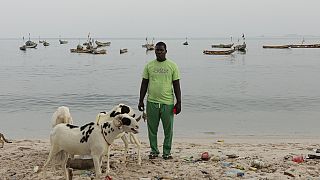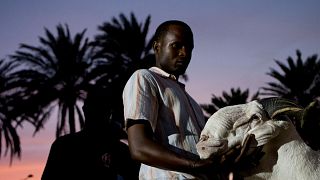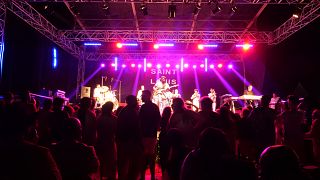Senegal
Eid al-Adha is the largest religious holiday of the year in much of West Africa.
The religious festival is locally known as Tabaski in Senegal. It's when Muslims kill and eat a sheep, making the animal extremely sought after in the days before the holiday.
Families save for months in advance to buy a sheep to be slaughtered to commemorate the Quranic tale of Ibrahim’s willingness to sacrifice his son Ismail as an act of obedience to God.
Ibrahima Diouf is a fisherman who lives in Dakar’s Thiaroye suburb, a community made up of other fishermen and their families.
Like his neighbors, his father was a fisherman, and he was born into the trade.
He says his father used to kill 3 or 4 sheep for Tabaski, and they would share the meat with the less fortunate.
But in recent years Senegal’s fishermen have had to compete with large fishing vessels from China, Europe and Russia, which have overfished the waters off the coast and left local fishermen with only a fraction of what they used to catch.
Diouf has barely been able to make ends meet, he says, and was unable to buy even one sheep this year.
“All I think about is Tabaski. I can’t even sleep. I can’t do anything,” he said from his one-room home near the beach.
Oumar Mbeye, like most fishermen in Thiaroye, started fishing as a child.
“If you went to the sea, you would come back quickly with fish. But right now, the sea is ruined. You lose more than you gain. You put your money into it, you go to sea and come back with nothing,” he said.
Poor communities like in Thiaroye overwhelmingly supported President Bassirou Diomaye Faye and his running mate Ousmane Sonko, who is now prime minister.
Sonko and Faye were both imprisoned under former president Macky Sall, and their release just weeks before the March election led to widespread celebrations in the capital.
The pair ran on a platform of change and promised to help Senegal’s fishermen, who fish on small wooden boats, to compete with large trawlers.
The government of former president Sall had signed fishing agreements with the EU that gave European vessels access to Senegal’s waters.
Diouf says he thinks it’s too early to tell if Faye’s presidency will live up to expectations.
“We supported them and had a lot of hope for them, and we hope that we will not be disappointed. We want them to change things,” he said.











01:06
China, Senegal pledge stronger strategic partnership during Beijing talks
01:30
Abu Dhabi hosts first Global South Economic Forum
01:43
TikTok star Khaby Lame plays soccer in Brazil after US detention
01:10
China to remove tariffs on goods from all African countries
01:52
138 million child workers globally in 2024, number down from 2020
02:25
São Tomé and Príncipe: helping fishers and their future